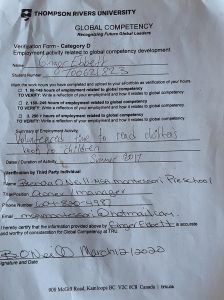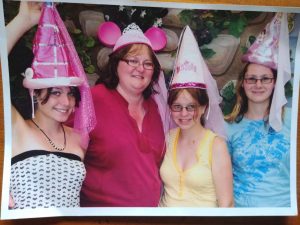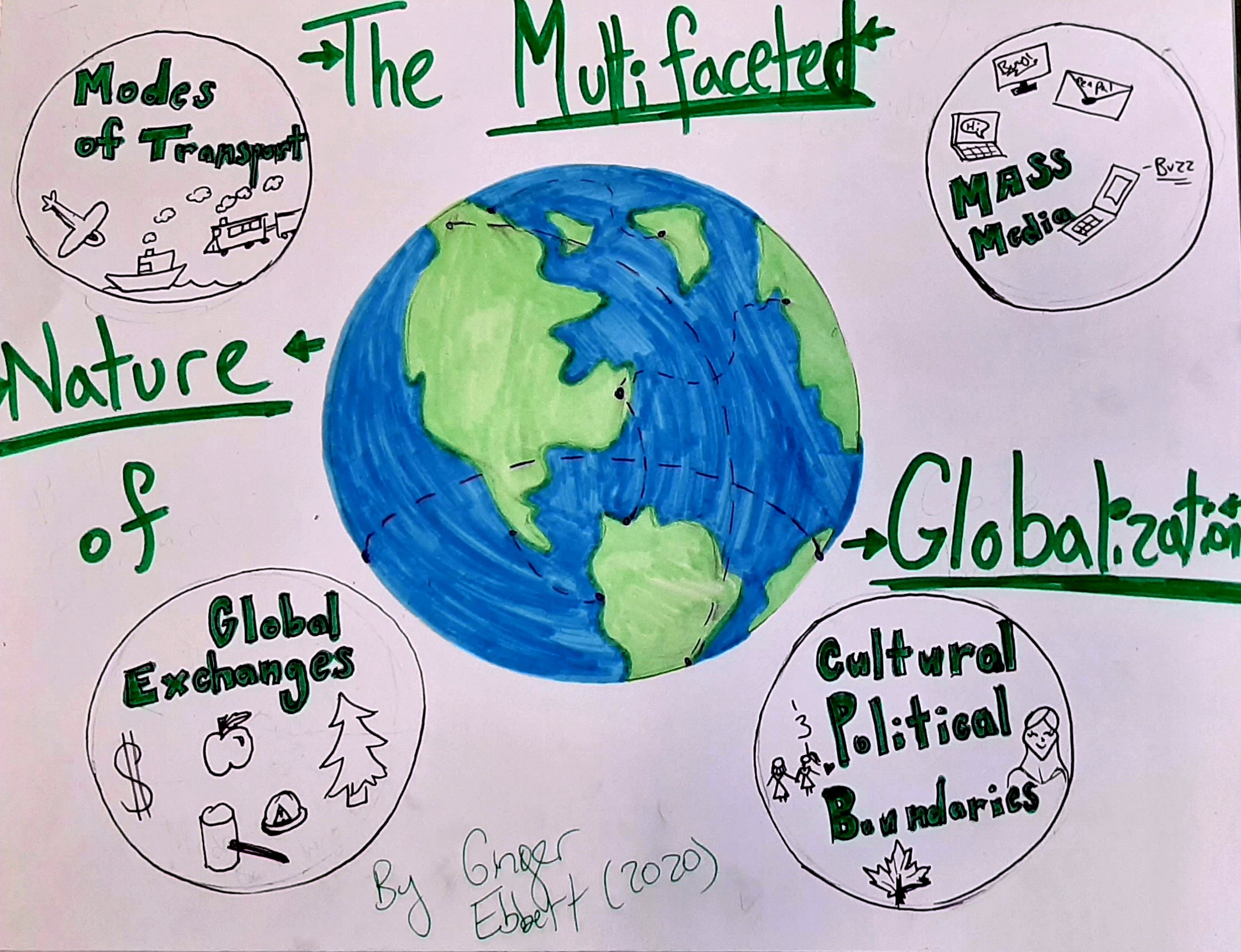French Level One and Two (Six Credits, 2 Points)
Learning a second language has provided me with an experience that has enhanced my knowledge surrounding the Global Competency Certificate. In particular, being able to speak with those who do not speak proficient English will allow me to understand the perspectives of others better. I found it interesting to explore the different ways that people express language, dialect, and syntax from other cultures. Further, I found the English language to be deeply grounded in the romantic languages of others. I also found it interesting to explore the different dialect spoken, as our textbook emphasized both the “Canadian” and “Francophone” versions of the same sentences. This is significant as it illustrates that there are unique sub-groups of a given language in the same way that there are multiple sub-cultures in the broader spectrum of society. One day, I hope to travel to Quebec and experience French-Canadian culture first hand.
English 4470 (3 Credits, 1 Point)
As an English Major, I have narrowed my focus on English literature at a university level. My time at Thompson Rivers University has provided me with the opportunity to explore many unique cultural perspectives that differ from my personal biases or experiences. Heather Macleod’s upper-level course, “Studies in Indigenous Literature,” taught me how to adopt a “Two-Eyed Perspective” that encourages the ability to empathize with the values of other cultures. While the course-content does include various groups of Indigenous peoples within Canada, it extends beyond geographic borders by focusing on Indigenous groups from the United States as well. This course covered multiple topics applicable to the Global Competencies Certificate, which include: the hurdles experienced while translating between oral and written traditions, political attempts at forced-assimilation into dominant Euro-Canadian culture, as well as assumptions about gender, class, and race.
Soc 2010 (3 Credits, 1 Point)
Jennifer Shaw’s course “Race and Ethnicity” discusses multiple issues surrounding social inequality including racialization, social stratification, and gender politics. This class supports students in actively engaging with their personal biases, prejudices, or ideological views. As a student, this class has shifted my cultural perspective by having me critically analyze how my personal views alter the way I perceive or interact with others. My studies in this class have contributed to me Global-Learning by challenging my world-view and looking at how it affects others. Further, this course has educated me on the historical-contexts that have created power-imbalances between dominant groups and those who are marginalized to the outskirts of society. As a result, I am more aware, understanding and empathetic towards the views of others.
Soc 4311 (3 Credits, 1 Point)
Although declaring Sociology as a Minor, the subject is a passion of mine and is a source of proverbial ‘bread and butter.’ Melody Hessing’s course, “Sociology of the Family,” has provided me with useful knowledge that is useful in completing the Global Competencies Certificate. For example, this course prompted students to explore the different forms, kinship structures, and stages of family life on a global level. A key takeaway from this course is that families come in all shapes or sizes. Further, I learned that Westernized nuclear family-systems are over-represented in the media despite the extensive cultural-variances on a global scale. Applicable topics that were covered include culture-clash, migration, violence, and multiple forms of social inequality experienced by global-families.
Soc 4301 (3 Credits, 1 Point)
Andreas Tomaszewski’s course, “Family Life in Contemporary Canada,” explores the multifaceted nature of family life in Canada. By applying a sociological lens, this course has contributed to my understanding of Global Competency by exploring multiple issues faced by families who belong to sub-cultural or minority groups. In particular, I gained insight into how Political Institutions, Government Legislations, and Discriminatory-stereotypes have created an unequal power dynamic between cultural groups. Further, this course emphasizes various case studies that describe the lived-experiences of families that are affected by these barriers. For example, this course covers globalization in close connection with ideological, political, economic, and social contexts.
Work Experience (35+ Hours, 5 Points)
As a self-published author, I have volunteered over 100 hours of experience interacting with both young readers and their parents. I have done signings and readings across the Lower Mainland. I have conducted readings or signings at many locations from Abbotsford, Chilliwack, Langley, Surrey, and throughout the Vancouver area. This included large areas of tourist-attraction, which means that I had interacted with people from a plethora of places. Further, I have volunteered to conduct readings in multiple school districts, playschools, daycares and libraries. My experiences have helped me gain experience interacting with, being sensitive to, as well as accepting the cultural views of others. Further, since my children’s challenges dominant discourses regarding gender-boundaries I have gained insight into the variety of cultural views on the subject. Essentially, this experience has helped deepen my engagement with and understanding of global competency.
Note: I did readings and signings that spanned anywhere from 15-60 minutes. This signature is from one of these readings.
(Also, I sent them the wrong form; I didn’t get paid during any readings/signings so it counts as Volunteer Work. Oops! However, they are not very tech-savvy and are located on the Coast. It was a feat to get this signed and scanned in! As there is still a signature verifying my time there, let’s run with it?).
Roadtrip to California (International Travels, 1 Point)
When I was fourteen, my family and I decided to venture on a two-week road-trip across the United States.
We stopped in Oregon, San Fransisco, California, and worked our way to Tijuana Mexico before returning to Canada. This trip contributed to my understanding of culture on a global scale by showing me a variety of ways people live. There are simple things that you take for granted in your home country. I found myself wondering how the United States could not know about Tim Horton’s, Chocolate Smarties, and Spongebob? As we travelled I found that people spoke with unique accents, dialects or languages in different places. Cultural values, ideologies and even the way people dressed changed drastically. This experience was essential to my love of Sociology as it was my first introduction to the wide range of diversity across the globe.
Give Back Piece
My poster, “Illustrating Global Competency,” is a visual representation of how prevalent globalization is in our society. Globalization is a multifaceted social phenomenon that is influenced by a variety of factors. Grounded by a sociological outlook, this poster includes four bubbles that illustrate the multiple levels of globalization. This list is not exhaustive, as the Global Competency Certificate is incapable of covering every aspect of the phenomenon. At the top right corner, there are modes of transport that have contributed to increased human migration on a global scale. At the top right, multiple forms of mass communication allow people to interact more efficiently on a global scale. Located on the bottom left is the topic of Global Exchanges, which include multi-national economic exchanges, trading environmental/natural resources, issues surrounding food security, as well as the transfer of population for labour. Lastly, the bottom right illustrates political and cultural boundaries. These include gender role expectations, legislation regarding sexuality, geo-political boundaries, as well as the freedom to practice one’s religion.
Reflective Essay






